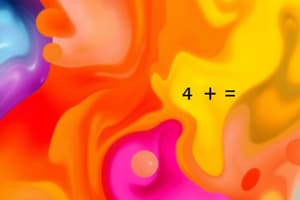Podcast
Questions and Answers
What is the sample space of the random variable Z representing non-defective laptops when 4 laptops are tested at random?
What is the sample space of the random variable Z representing non-defective laptops when 4 laptops are tested at random?
If two coins are tossed and P represents the number of heads, what values can P take?
If two coins are tossed and P represents the number of heads, what values can P take?
Which of the following represents a discrete random variable among the given options?
Which of the following represents a discrete random variable among the given options?
In a random selection of two balls (one white and one yellow) with replacement, what is the maximum value of the random variable X representing the number of white balls selected?
In a random selection of two balls (one white and one yellow) with replacement, what is the maximum value of the random variable X representing the number of white balls selected?
What defines a continuous random variable compared to a discrete random variable?
What defines a continuous random variable compared to a discrete random variable?
If a family has 4 children, what are the potential values of the random variable representing the number of boys in the family?
If a family has 4 children, what are the potential values of the random variable representing the number of boys in the family?
In statistical terms, which of the following is not an example of a discrete random variable?
In statistical terms, which of the following is not an example of a discrete random variable?
If Z indicates the number of non-defective laptops tested from a total of 4, what possible values can Z take?
If Z indicates the number of non-defective laptops tested from a total of 4, what possible values can Z take?
What is the number of defective phones if the discrete random variable is defined based on total inspections being 3 and laptops being 4?
What is the number of defective phones if the discrete random variable is defined based on total inspections being 3 and laptops being 4?
What defines the sample space in a coin toss experiment involving three coins?
What defines the sample space in a coin toss experiment involving three coins?
If three coins are tossed, how many unique combinations of heads and tails can be observed?
If three coins are tossed, how many unique combinations of heads and tails can be observed?
What is a random variable in the context of this coin tossing experiment?
What is a random variable in the context of this coin tossing experiment?
What will happen to the number of unique outcomes if the number of coins tossed increases to four?
What will happen to the number of unique outcomes if the number of coins tossed increases to four?
In empirical research, outcomes are generally defined as:
In empirical research, outcomes are generally defined as:
In the experiment, if the outcome HTH has already been recorded, what should be done next?
In the experiment, if the outcome HTH has already been recorded, what should be done next?
In the context of coins tossed, what does 'frequency' refer to?
In the context of coins tossed, what does 'frequency' refer to?
Which of the following best describes an 'experiment' in a scientific context?
Which of the following best describes an 'experiment' in a scientific context?
When four coins are tossed, what is the maximum number of heads that can be recorded?
When four coins are tossed, what is the maximum number of heads that can be recorded?
If you assign the variable 'X' to represent the number of heads obtained in the experiment, which aspect does 'X' refer to?
If you assign the variable 'X' to represent the number of heads obtained in the experiment, which aspect does 'X' refer to?
Which scenario represents a continuous random variable?
Which scenario represents a continuous random variable?
What distinguishes a discrete random variable from a continuous random variable?
What distinguishes a discrete random variable from a continuous random variable?
In the context of random variables, which would be classified as a discrete variable?
In the context of random variables, which would be classified as a discrete variable?
If four coins are tossed, what would be the possible values of the random variable G representing the number of tails?
If four coins are tossed, what would be the possible values of the random variable G representing the number of tails?
Which of the following would be considered a continuous variable?
Which of the following would be considered a continuous variable?
In the study of random variables, which would NOT be classified as discrete?
In the study of random variables, which would NOT be classified as discrete?
Which of the following scenarios illustrates a countable discrete variable?
Which of the following scenarios illustrates a countable discrete variable?
How would you classify the variable representing the average amount of electricity consumed per household?
How would you classify the variable representing the average amount of electricity consumed per household?
Which statement correctly describes discrete random variables?
Which statement correctly describes discrete random variables?
When measuring the speed of a car, what type of random variable is this classified as?
When measuring the speed of a car, what type of random variable is this classified as?




